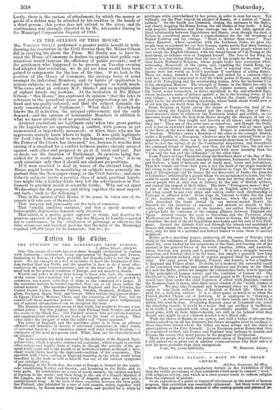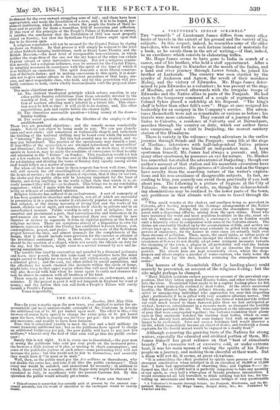THE CRYSTAL PALACE: A HINT TO THE BROAD CHURCH.
Ashton, Sotnereet, 2e1,31ity.
Sin—There was no more satisfactory feature in the Exhibition of 1851 than the visible prevalence of that sentiment which seeks to connect "work" with religious service, and which as a consequence tends to redeem religion from the reproach of pietism. As an exposition of a point or degree of attainment in the march of human progress, that exhibition was essentially ephemeral : but there.were certain aspects of the pageant which seemed to offer resting-points and-places of re. freshment for the ever onward struggling SOBB Of toil; and these have been appropriated, and made the foundation of a new, and, it is to be hoped, per- manent institution, which offers to return the people the fruits of their la- bour and to provide for them a boundless field of recreation and reflection. If this view of the principle of the Peoples Palace at Sydenham is correct, it justifies the conclusion that the Exhibition of 1851 was most properly closed on Sunday, but that the Sydenham Crystal Palace ought upon that day to be thrown open.
A religious reputation will not be secured for the Crystal Palace by closing its doors on Sunday. By that process it will simply be reduced to the level of other Sabbath-keeping institutions, such as Drury Lane Theatre and the British Museum,—the dead level of irresponsible non-existence, in which neither the stage-fires of the one nor the dry bones of the other can exhale Cyprian odours or utter instructive warnings. But not a religious reputa- tion merely, but a religious influence, may be secured for the Crystal Palace, by adopting measures in accordance with the spirit of the time of which it is so brilliant an emanation. This spirit demands a more liberal construc- tion of Sabbath duties; and in making concessions to this spirit, it is desir- able not to give undue offence to the ancient prejudices of that large, sin- cere, and most respectable class, who hold, and for this generation will pro- bably continue to hold, views wholly irreconcileable ith the proposed inno- vation. The main objections are three- 1st. The abstract theological printiple which refuses sanction to any ' other public Sunday exhibitions than those ostensibly devoted to the worship of God, or (never mind the gulf between) to the considera- tion of matters affecting man's interest in a future life. This objec- tion must be left to time : it will yield to its destiny, and, like other superstitions, pale and expire before the clearer light. 2d. The obnoxious mercantile question—taking money at the doors— Sunday trading. 3d. The social question affecting the liberties of the employi.:s of the establishment.
These two are practical objections ; and the remedy seems wonderfully simple. Nobody can object to being made to pay. We can pay church- rates and sent-rents; and sometimes at fashionable chapels and cathedrals the tinkling of the national shilling may be heard even while the minister is "intoning" the prayers. But this last scandal may be avoided, and we may pay. beforehand. The practice of the operabouses may furnish a hint. If four-fifths of the opera-tickets are obtained beforehand at musicsellers' and librarians', tickets for Sydenham, obtainable on week-days of certain agents in London, may be made the condition of conveyance to that locality and admission to the "Palace" on Sunday. This regulation would set free not a few cashiers both on the line and in the building ; and arrangements for minimizing and dividing the turns of Sunday duty equally among all the staff would follow as a matter of course.
But when all that can be done in these respects has been well done, there will still remain the old stumblingblock of offence—trains running during the hours of service ; or the more practical objection, that if they eo not run, the clerks and the public alike will be lounging impatient for the hour of liberty, and doing anything in the world rather than that which it is al- ready assumed they will do—go to church. This brings me to my concluding suggestion - which I make with the utmost deference, and in no spirit of levity or defiance of established opinions. Religion hitherto has suffered from exclusiveness. A sort of monopoly of it has been granted to churches and chapels, not all of which are successful in presenting it in a guise to render it extensively popular or attractive ; so that religion, or the strong necessity of loving God and the works of his hands, shrinks out of sight, and exercises itself chiefly in private and in an unauthorized manner. Public worship is only a part of religion ; but so essential and prt€minent a part, that conventionality and listlessness in its performance are not more to be deprecated than any attempt by new theories or devices to supersede it from its rightful position at the head of religious services. There are symptoms abroad of a disposition to own the intimate conuexion which the Creator has established between labour, rest, contemplation, prayer, and praise. The magnificent scale of the Sydenham project favours the idea, and almost demands for the completeness of the design, that it should include some provision for the exercise or effusion of the devotional sentiment ; that, in short, the crowning act of the work should be the erection of a chapel, where not merely the officials on duty for the day, but the visitors, might come to a service warmed by new cud in- spiring associations.
The terrible line fixed by convention and guarded by a thousand jealousies and fears, once pessed, from this table-land of superlative facts the mind might ascend to heights far removed, but still within reach, and gilded with a celestial glory ; and the soul, too often dulled by sordid aspirations, and the affections too much chained like instincts within the circle of home, might take wing to that upper region where One will meet the aspirant who will also descend with him when he turns again to earth and resumes the task he shares in common with all brethren of his kind.
There remain yet two important considerations—an endowment, and a minister. If the project is good it will not languish in England for want of money ; and the nation that can call forth a People's Palace will surely furnish a People's Parson.



























 Previous page
Previous page